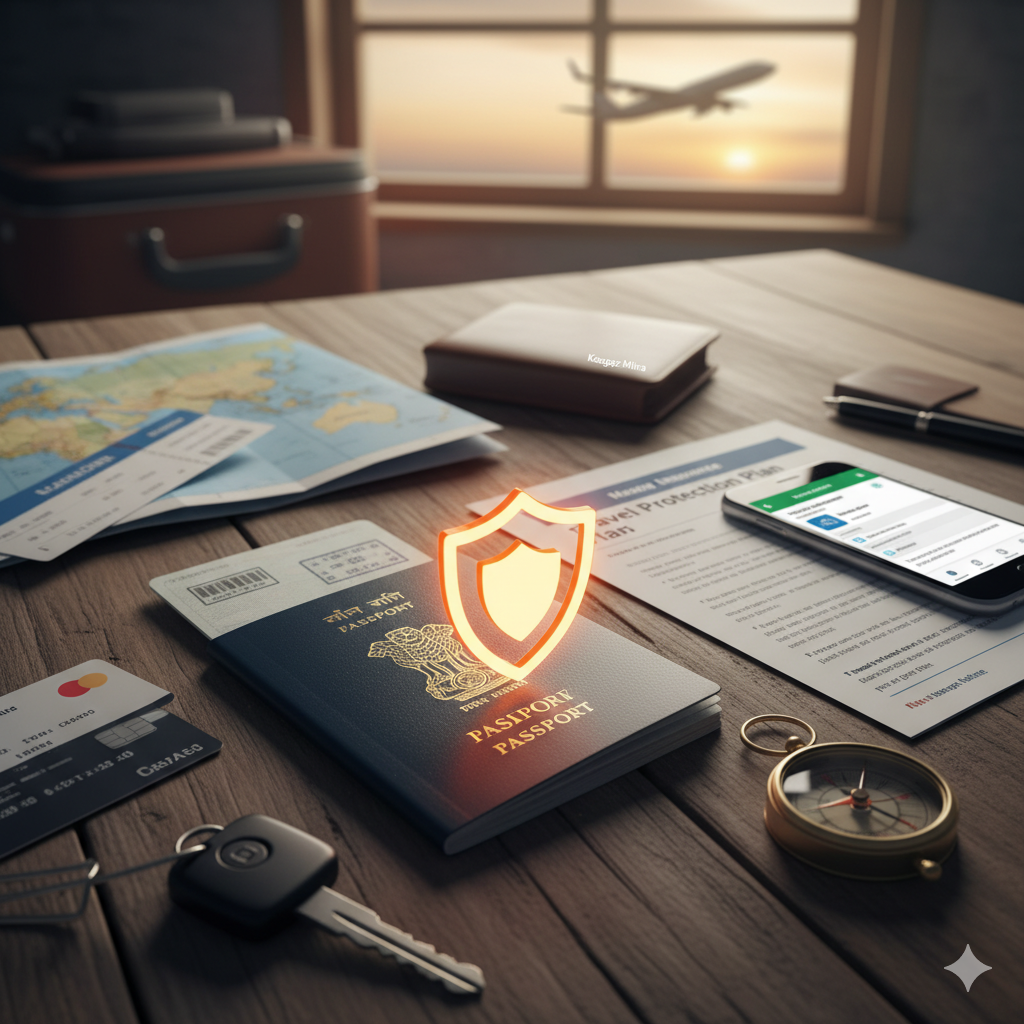A Guide to Travel Insurance for International Trips from India (2025)
Published on September 15, 2025

You've booked your flights, planned your itinerary, and applied for your visa. In the excitement of planning an international trip, it's easy to overlook one of the most critical pieces of 'kaagaz': travel insurance. Many travellers from India view it as an optional expense or just another box to tick for a visa application.
However, a good travel insurance policy is your most important safety net when you're in a foreign country. It protects you from unforeseen events that can turn a dream vacation into a financial nightmare. At Kaagaz Mitra, we believe in smart preparation. This guide will explain why travel insurance is essential and how to choose the right policy for your international journey from India.
What is Travel Insurance, and Why is it Non-Negotiable?
Travel insurance is a policy that protects you from a range of financial losses and emergencies that can occur while you're travelling. Think of it as a temporary health and assets policy that covers you from the moment you leave home until you return.
For some destinations, like the 29 countries in the Schengen Area, having valid travel insurance isn't just recommended—it's a mandatory requirement for your visa application.
Beyond visa requirements, here’s why it's a must-have:
- Sky-High Medical Costs Abroad: Medical care in countries like the USA, Canada, and Europe can be incredibly expensive. A minor accident or illness could lead to bills worth lakhs of rupees.
- Trip Disruptions Happen: Flights get cancelled, medical emergencies can force you to cut your trip short, or you might have to cancel your trip altogether due to an issue at home.
- Lost Belongings: Airlines can lose your baggage, or you could be a victim of theft. Replacing essentials like clothes, documents, and valuables in a foreign country is costly and stressful.
Decoding Your Policy: Key Types of Coverage to Look For
When you compare travel insurance plans, you'll see a lot of jargon. Here are the most important types of coverage for an Indian traveller:
- Medical and Hospitalization Cover: This is the most critical component. It covers expenses for emergency medical treatment, hospitalization, doctor's fees, and even emergency medical evacuation back to India if required.
- Trip Cancellation and Interruption Cover: This reimburses you for your pre-paid and non-refundable travel costs if you have to cancel your trip due to a covered reason, such as a medical emergency or the death of a close family member.
- Baggage Loss or Delay Cover: If the airline loses your checked-in baggage, this provides a lump sum amount to compensate you. If your baggage is delayed for more than a specified period (e.g., 12 hours), the policy will provide a smaller amount to buy essential items.
- Passport and Document Loss: Losing your passport abroad is a major hassle. This coverage helps with the costs associated with getting a duplicate or temporary passport.
- Personal Liability Cover: This protects you if you accidentally cause injury to someone else or damage their property while abroad. It covers the legal expenses you might incur.
How to Choose the Best Travel Insurance Plan
Not all policies are created equal. Here’s how to select the right one for your trip:
- Consider Your Destination: For Schengen countries, you need a minimum coverage of €30,000. For the USA and Canada, a higher sum insured ($100,000 or more) is highly recommended due to high healthcare costs.
- Check the Duration and Frequency: You can buy a single-trip policy for one vacation. If you are a frequent international traveller, an annual multi-trip policy can be more cost-effective.
- Declare Pre-existing Conditions: Always be honest about any pre-existing medical conditions (PEDs). While many standard policies exclude them, some insurers offer specialized plans or waivers that provide coverage for life-threatening emergencies arising from PEDs. Hiding this information can lead to claim rejection.
- Read the Fine Print (Exclusions): Pay close attention to what the policy *does not* cover. Common exclusions include self-inflicted injuries, incidents under the influence of alcohol, and high-risk adventure sports unless you buy a specific add-on.
Filing a Claim: What to Do in an Emergency
Knowing how to file a claim is as important as buying the policy. In case of an emergency, follow these steps:
- Contact Your Insurer Immediately: All insurance companies have a 24/7 international helpline. Save this number in your phone and inform them of the situation as soon as possible.
- Understand Cashless vs. Reimbursement: For medical emergencies, your insurer may have a network of hospitals where you can avail of cashless treatment. For other hospitals, you may need to pay first and get the amount reimbursed later.
- Keep All Documents: Preserve all original bills, receipts, medical reports, and official statements (like a police report for theft). These documents are essential for claim processing.
Special Considerations for Indian Travellers
- Senior Citizen Plans: If you are travelling with elderly parents, look for specialized senior citizen plans. These often have co-payment clauses but are designed to cover age-related health issues.
- Student Plans: For those going abroad to study, student travel insurance plans are a must. They offer long-term coverage that often includes study interruptions and sponsor protection.
Choosing the right travel insurance is a small investment that provides invaluable peace of mind. It ensures that a mishap doesn't derail your finances, allowing you to focus on what matters most: enjoying your international trip.